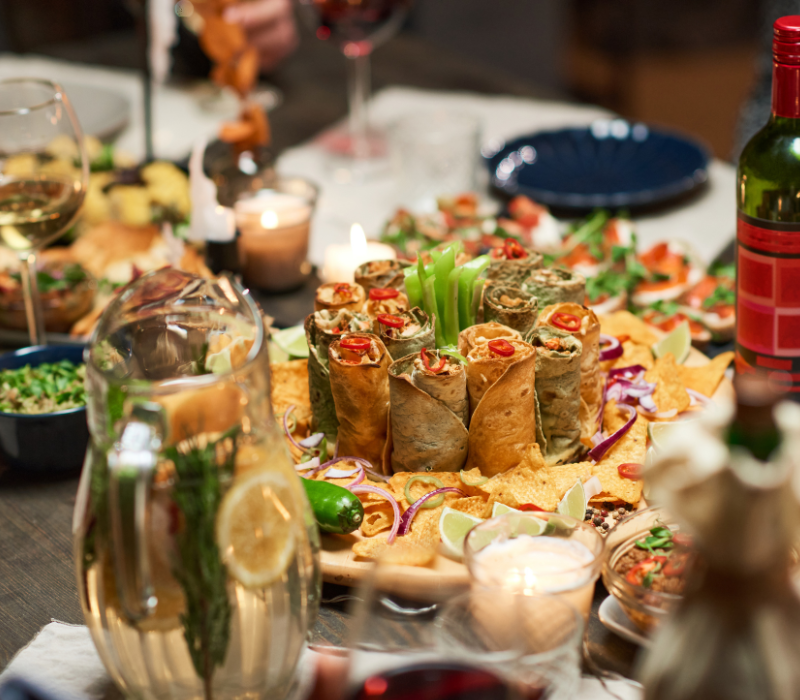Blog
The 5 Most Interesting Facts About Film Catering

Film catering and craft services are essential for ensuring that a film shoot runs smoothly. Without proper nourishment, film cast and crew members would struggle to meet the demands of long, exhausting days. While audiences often pay attention to things such as costumes, narrative, sound, and directing, the behind-the-scenes efforts of catering for film are often overlooked. In this blog we’ll tell you the 5 most interesting facts about Film and TV catering.
1. THE HISTORY OF FILM CATERING IS ROOTED IN HOLLYWOOD'S GOLDEN AGE
The history of film catering is almost as long as the film industry itself. In the early days of Hollywood, film sets were often set in isolated places, making it difficult for cast and crew to come to the studio or their homes for meals. As a result, studios began to provide meals on set, creating the film catering field.
A woman named Lena Shore was one of the first well-known film caterers, beginning in the 1920s by catering for the cast and crew of silent films. She is widely credited for inventing the "box lunch," a self-contained meal that could be easily transported and served on location.
The film catering industry developed and evolved with the film industry. By the Golden Age of Hollywood in the 1930s and 1940s, studios had huge, well-equipped kitchens and dining facilities on their lots, and film and TV catering had become a key component of the production process.
2. FILM CATERERS FACE UNIQUE CHALLENGES
Catering for film is not the same as catering for a wedding or corporate event. Film caterers face a number of specific issues, including:
- Long hours:Film shoots often involve early call times and late wraps, meaning caterers may need to provide meals and snacks for 12 or more hours a day.
- Remote locations:Film shoots often take place in remote or challenging locations, from deserts to mountaintops, which can make sourcing ingredients and equipment difficult.
- Large numbers:Film sets can involve hundreds of cast and crew members, all of whom need to be fed and hydrated throughout the day.
- Special dietary needs: With so many people to feed, it's inevitable that film sets will include individuals with a wide range of dietary needs and restrictions, from vegetarians and vegans to those with food allergies or religious restrictions.
- Weather and scheduling: Film shoots are often at the mercy of the weather, and a sudden change in conditions can mean a last-minute change in plans for the caterers. Similarly, filming schedules can be unpredictable, with sudden changes in location or timing that location catering must adapt to.
3. FILM CATERING IS A WELL-OILED MACHINE
To fulfil the demands of Film and TV catering, caterers created a highly organized and efficient system. These caters follow a step-by-step process:
- Planning: Before the shoot begins, the caterers will meet with the production team to discuss the filming schedule, locations, and the number of cast and crew members to be fed. They'll also go over any special dietary needs or restrictions.
- Shopping and preparation:Once the plan is in place, the caterers will shop for ingredients and begin preparing meals and snacks. This often involves cooking in large quantities and preparing food that can be easily transported and stored.
- Set-up:On the day of the shoot, the caterers will arrive on set early to set up the catering area. This typically includes a kitchen or prep area, a dining area, and a separate area for snacks and beverages.
- Meal service:During the shoot, the caterers will provide meals and snacks at set times, often following a strict schedule. They'll also keep the cast and crew hydrated with a constant supply of water, coffee, and other beverages.
- Clean-up: After the shoot wraps for the day, the caterers will clean up the catering area and pack up any leftover food. They may also provide a late-night snack or "midnight lunch" for the crew if the shoot runs into the early morning hours.
4. FILM CATERERS ARE PART OF THE FILM COMMUNITY
Catering for Film is more than simply a job; it is a community. Many film caterers are former film industry professionals, or they have family or friends who work in the industry. As a result, they understand the unique problems and demands of film sets and can offer a useful service that goes beyond food.
Film caterers often become connected to the film community, establishing long-term ties with cast and crew people. It is not common for caterers to work on many films with the same director or production firm, or to be requested by name for particular productions.
5.THE FOOD CAN BE PRETTY AMAZING
While film catering is certainly a difficult job, it can also be very fulfilling. And one of the best benefits is the food. Film caterers often go above and beyond to prepare delicious, high-quality meals for the cast and crew. From gourmet sandwiches and salads to hot, freshly made meals, film sets can provide a surprising variety of culinary delights.
Of course, the food has to be practical and portable, so there are plenty of grab-and-go options such as wraps, fruit, and energy bars. However, don't be shocked if you find yourself wanting a film set dinner long after the cameras have finished shooting.
Conclusion
Film catering is an important but frequently neglected part of the film industry. It involves an individual set of talents and challenges, and caterers in this industry are dedicated experts who play an important part in keeping productions operating successfully. So, the next time you're watching a movie, take a moment to appreciate the hard work and wonderful cuisine that go into keeping the actors and crew fed and satisfied.
We at PEEPAL UK provide the best Film catering in London.

